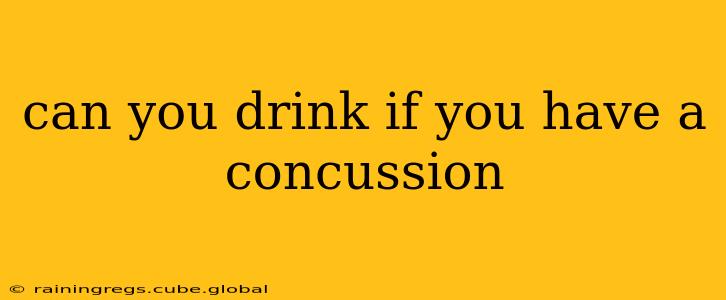A concussion, also known as a mild traumatic brain injury (mTBI), is a serious injury that disrupts the normal function of your brain. While the effects can vary greatly from person to person, one thing remains consistent: alcohol should be strictly avoided after a concussion. This isn't just a suggestion; it's crucial for your recovery and overall well-being.
Alcohol acts as a depressant, slowing down brain activity. After a concussion, your brain is already struggling to recover. Adding alcohol to the mix exacerbates the problem, potentially prolonging recovery time and increasing the risk of serious complications.
Why Alcohol Is Harmful After a Concussion
The effects of alcohol on a concussed brain are multifaceted and potentially severe. Here's why you should abstain:
-
Increased Inflammation: Alcohol can increase inflammation in the brain, further hindering the healing process. The brain is already inflamed after a concussion; alcohol only adds fuel to the fire.
-
Impaired Cognitive Function: Alcohol impairs cognitive functions like memory, concentration, and judgment—all of which are already compromised after a concussion. This can lead to difficulties with learning, problem-solving, and everyday tasks.
-
Sleep Disturbances: Alcohol can disrupt sleep patterns, and getting sufficient, quality sleep is essential for brain recovery. A concussion often leads to sleep problems, and alcohol only worsens this.
-
Increased Risk of Bleeding: In some cases, a concussion can involve bleeding within the brain. Alcohol can increase the risk of bleeding or worsen existing bleeding, leading to potentially life-threatening consequences.
-
Delayed Healing: Alcohol interferes with the body's natural healing processes, potentially delaying your recovery from a concussion and increasing the likelihood of long-term symptoms.
-
Increased Risk of Re-Injury: Impaired judgment and coordination due to alcohol increase your risk of sustaining another head injury, which could have devastating consequences.
How Long Should I Avoid Alcohol After a Concussion?
There's no one-size-fits-all answer to this question. The duration you should avoid alcohol depends on the severity of your concussion and your individual recovery progress. Always follow the advice of your doctor or other healthcare professional. They will assess your specific situation and provide personalized recommendations. Generally, it's advisable to abstain from alcohol until you've fully recovered from your concussion and have received medical clearance.
What About Other Substances?
Similar to alcohol, other substances like recreational drugs should also be strictly avoided after a concussion. These substances can further complicate your recovery and potentially lead to severe health consequences.
What Are the Symptoms of a Concussion?
Recognizing the symptoms of a concussion is crucial for prompt medical attention. These symptoms can vary greatly but may include:
- Headache
- Dizziness
- Nausea and vomiting
- Sensitivity to light or sound
- Confusion
- Memory problems
- Difficulty concentrating
- Balance problems
- Sleep disturbances
- Mood changes
If you experience any of these symptoms after a head injury, seek immediate medical attention.
Can I Drink Coffee or Caffeine After a Concussion?
While alcohol is a definite no, there's less clear-cut guidance on caffeine. Some find that caffeine exacerbates headache symptoms, while others find it helps with fatigue. It's best to listen to your body and consult your doctor. If caffeine seems to worsen your symptoms, it's advisable to avoid it.
What Should I Do If I Think I Have a Concussion?
If you suspect you may have a concussion, seek medical attention immediately. Early diagnosis and treatment are essential for optimal recovery. Don't hesitate to contact your doctor or go to the nearest emergency room.
This information is for general knowledge and does not constitute medical advice. Always consult with a healthcare professional for diagnosis and treatment of any medical condition.
